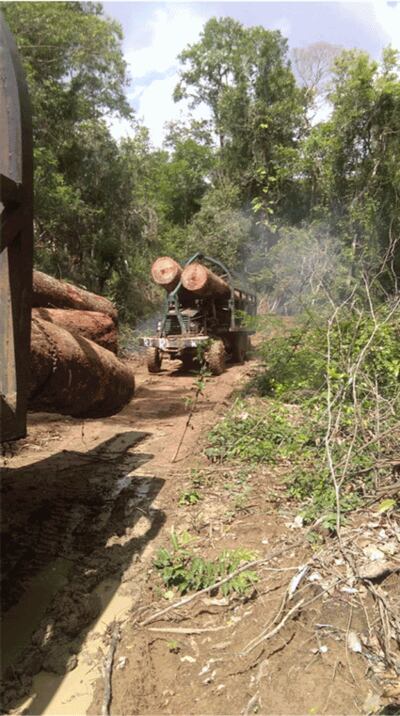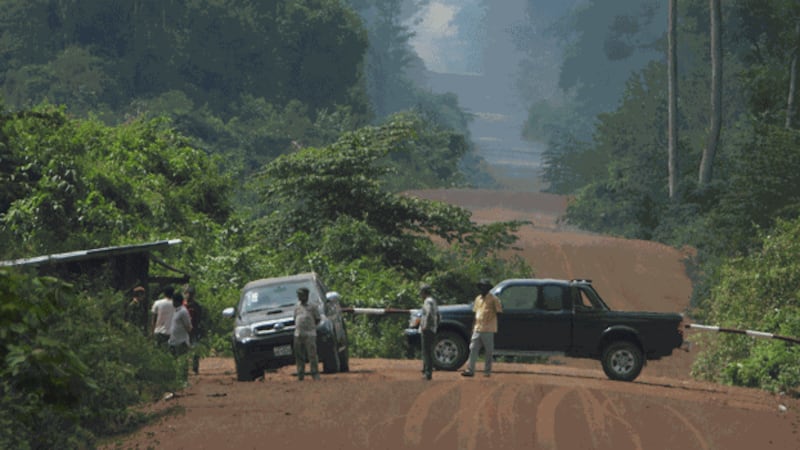Illegal deforestation and government restrictions on forest access are undermining the spiritual practices, land rights, and livelihoods of one of Cambodia’s largest Indigenous groups, according to a report by Amnesty International issued Friday.
The report, “’Our Traditions Are Being Destroyed’: Illegal Logging, Repression, and Indigenous Peoples’ Rights Violations in Cambodia’s Protected Forests,” says illegal logging has been particularly damaging to the Kuy people in the Prey Lang and Prey Preah Roka rainforests, which contain protected wildlife sanctuaries.
The Prey Lang Forest runs through Kampong Thom, Preah Vihear, Kratie and Stung Treng provinces in northern Cambodia, while Prey Preah Roka is in Preah Vihear province.
Cambodia’s rate of deforestation is among the world’s fastest, and a survey published in 2020 by U.S. and EU monitors showed that Prey Lang lost more than one football pitch (1.76 acres) of woodlands to illegal logging every hour of 2019.

There are about 70,300 Kuy people in Cambodia who in total comprise a quarter of the country’s Indigenous peoples, according to data from the Cambodia Indigenous Peoples Association issued in 2019. There are approximately 24 Indigenous groups in the country.
Many, like the Kuy, have a close connection with traditional forested lands on which their livelihoods and cultural practices are based. They depend primarily on resin from trees for lighting and to sell for boat caulks, paints and varnishes.
Illegal loggers increasingly harvest resin trees in the two rainforests for timber to make furniture and ceiling beams, undermining the Kuy people’s traditions and an important economic resource for their communities, the London-based human rights group says.
“Rampant illegal logging in Cambodia is posing an existential threat to the country’s remaining primary forests, and the Indigenous peoples who depend on them for their livelihoods, their culture and their spiritual practices,” Richard Pearshouse, Amnesty’s head of crisis and environment, said in a printed statement.
“Time and time again, government officials who are supposed to be protecting these precious forests are instead profiting from their destruction by allowing the illegal logging trade to flourish.”
Cambodian authorities are legally obligated to protect the rights of Indigenous peoples, including their culture and participation in the sustainable management and conservation of protected areas.
Amnesty and remote sensing agency Space4Good analyzed data that revealed extensive recent deforestation in the two protected areas, with a remote sensing calculation showing that nearly 6,300 hectares (15,600 acres) were deforested in 2021. Amnesty also based the report’s findings on open source information, such as reports by civil society organization and published news and academic articles.
Amnesty interviewed 20 community activists who work to protect the Prey Lang and Prey Preah Roka rainforests between June and October 2021. The majority of the interviewees said they were Kuy. All of them live in communities in or near the forests.
One person interviewed said that about 70 percent of resin trees in Prey Preah Roka had disappeared in recent years because people from outside the area felled the trees when people were away planting saplings or harvesting rice.
“This is when they get stolen the most, because people know we are busy in our fields which are far from Prey Preah Roka,” said the activist, who was not identified with his real name so as to speak freely. “Sometimes in one day, 30 or 40 resin trees will be cut.”
The activist added that the deforestation was eroding Kuy culture for future generations.
“The younger generation will never get to know all the important places for us in the forests. … There are ancient villages that were once inside the forest, and we still pay our respects to spirits of our ancestors. Now, these places have been destroyed because of logging.”
Other community members in Prey Lang said that illegal loggers sometimes offered to buy resin trees from them and that they felt that they had to accept whatever payment was offered because the loggers would cut down the trees regardless.

Police officers and Cambodian Ministry of Environment officials have routinely demanded and accepted bribes for turning a blind eye to illegal logging. Police checkpoints are set up not to dissuade the practice but to extract money from loggers, Kuy people in both rainforests said.
“The big problem is that the authorities, especially the Ministry of Environment, are only interested in collecting money,” an interviewee familiar with the situation in Prey Lang was quoted as saying. The person informed the ministry’s provincial office about the illegal logging and provided photos of it.
“They go to investigate it — but they only investigate it to collect [bribes] from the loggers,” the person told Amnesty.
Cambodia’s Ministry of Environment has restricted local communities and forest activists, from patrolling and protecting forests in accordance with the provisions on the rights and duties of citizens, as specified in Cambodia’s constitution and laws for protecting nature.
“It is essential that Indigenous-led community groups are enabled and empowered to engage in forest patrols and other protection activities,” Pearshouse said. “Indigenous peoples are widely recognized as the most effective protectors of their traditional lands, and Cambodia’s ongoing ban on community groups’ access is a blatant violation of their human rights.”
